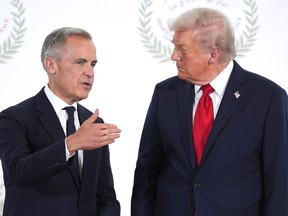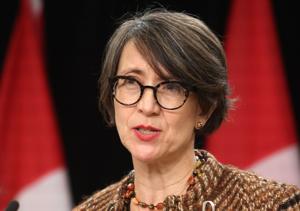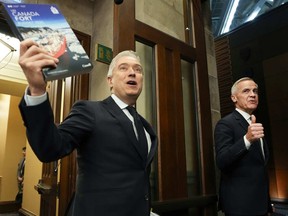World
Mark Carney Shifts Canadian Trade Strategy Amid US Tensions

Prime Minister Mark Carney has transitioned from a confrontational trade approach to a more diplomatic strategy in response to ongoing trade tensions with the United States. Despite the imposition of heavy tariffs on Canadian goods by the Trump administration, Carney’s government has opted against retaliatory measures, focusing instead on low-profile negotiations aimed at sectors critical to the Canadian economy, including aluminium, steel, and automotive industries.
This strategic pivot marks a significant change from the assertive rhetoric Carney employed during his campaign seven months ago. Editorials have noted this shift, suggesting he has adopted a more “elbows down” approach, emphasizing dialogue over confrontation.
Carney recently stated that Canada is “not considering hitting American goods with more retaliatory tariffs.” This decision comes despite the ongoing U.S. tariffs on Canadian steel, aluminium, automobiles, and lumber. Carney argues that further retaliatory actions could jeopardize the high-level negotiations with Washington, which are intended to de-escalate tensions.
Ontario Premier Doug Ford and several labour organizations have voiced their concerns, urging Carney to take a firmer stance against U.S. tariffs. They argue that job losses and a slowdown in investment warrant a more aggressive response. Nevertheless, Carney maintains that “now is a time to talk,” highlighting the importance of dialogue in navigating these complex trade negotiations.
Potential Benefits of a Conciliatory Approach
Recent developments suggest that Carney’s diplomatic approach may yield positive outcomes. According to a report by Bloomberg News, the Trump administration may ease auto tariffs in the near future. The report indicates that the U.S. Department of Commerce is preparing to announce a five-year extension of an arrangement that would allow American automakers to reduce tariffs on imported car parts. This change could significantly lower costs associated with cross-border vehicle trade and help Canadian manufacturers sustain their operations.
The easing of tariffs could protect thousands of Canadian jobs and reinforce the country’s role as a vital supplier in the North American automotive supply chain.
Carney acknowledged in a recent interview with Mishal Husain of Bloomberg that the U.S. trade war has made his candidacy for Prime Minister more relevant. As trade discussions intensify in light of the Canada-United States-Mexico Agreement, he anticipates necessary renegotiations. “There will be a renegotiation of some elements,” Carney stated, noting that the U.S. president has expressed a desire for adjustments.
While Carney has faced criticism for his evolving stance, he pointed out that Canada was one of the first nations, alongside China, to impose retaliatory tariffs. He remarked on the benefits of backing off from the digital service tax, noting that it led to an executive order from President Trump confirming tariff-free status for a majority of Canadian trade.
Public Perception and Political Implications
Carney’s shift toward negotiation over confrontation has drawn mixed reactions from the public. Recent polling from the Angus Reid Institute shows a decline in Carney’s personal approval rating for the first time since taking office. Meanwhile, support for Carney’s Liberal government remains closely contested with the Conservatives. An Ipsos poll conducted in early October revealed that approval for the Liberal government under Carney stands at 58 percent, a notable increase from earlier in the year.
As the Canadian political landscape evolves, the implications of Carney’s trade strategy will likely play a critical role in upcoming elections. Should another federal election occur soon, the Liberal Party would hold a narrow four-point lead over the Conservatives, reflecting a competitive political environment.
In summary, Mark Carney’s diplomatic pivot in trade relations with the United States signifies a notable strategy shift aimed at fostering dialogue rather than confrontation. As negotiations continue, the impact of this approach on both the economy and public sentiment remains to be seen.
-

 Politics4 weeks ago
Politics4 weeks agoSecwepemc First Nation Seeks Aboriginal Title Over Kamloops Area
-

 World5 months ago
World5 months agoScientists Unearth Ancient Antarctic Ice to Unlock Climate Secrets
-

 Entertainment5 months ago
Entertainment5 months agoTrump and McCormick to Announce $70 Billion Energy Investments
-

 Science5 months ago
Science5 months agoFour Astronauts Return to Earth After International Space Station Mission
-

 Lifestyle5 months ago
Lifestyle5 months agoTransLink Launches Food Truck Program to Boost Revenue in Vancouver
-

 Technology3 months ago
Technology3 months agoApple Notes Enhances Functionality with Markdown Support in macOS 26
-

 Lifestyle3 months ago
Lifestyle3 months agoManitoba’s Burger Champion Shines Again Amid Dining Innovations
-

 Top Stories2 months ago
Top Stories2 months agoUrgent Update: Fatal Crash on Highway 99 Claims Life of Pitt Meadows Man
-

 Politics4 months ago
Politics4 months agoUkrainian Tennis Star Elina Svitolina Faces Death Threats Online
-

 Sports5 months ago
Sports5 months agoSearch Underway for Missing Hunter Amid Hokkaido Bear Emergency
-

 Politics5 months ago
Politics5 months agoCarney Engages First Nations Leaders at Development Law Summit
-

 Technology5 months ago
Technology5 months agoFrosthaven Launches Early Access on July 31, 2025




















